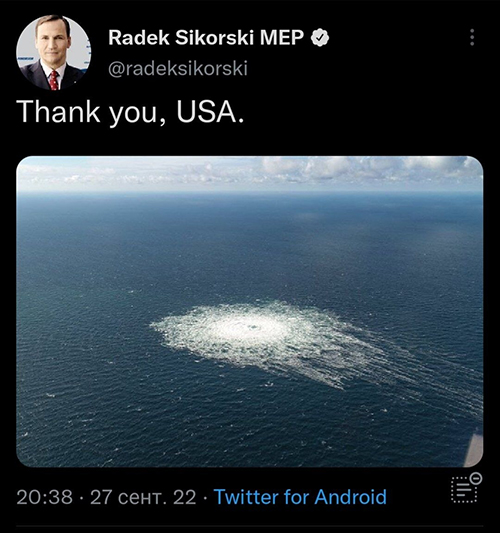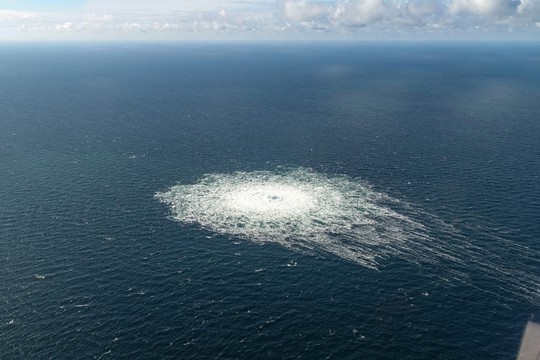Gas leak at Nord Stream 2 as seen from the Danish F-16 interceptor on Bornholm, Denmark September 27, 2022.
Photo: Danish Defence Command via REUTERS
The US continues to conceal the true reasons for the destruction of the Nord Stream gas pipeline. That’s what they write, wanting to divert the investigation from the real perpetrators of the explosions.
German detectives have spent three years building their case. A Ukrainian veteran could soon be in the dock, ‘The Washington Post’ writes.
For three years, a team of detectives gathered each weekday morning around a whiteboard at the German Federal Police headquarters in Potsdam, near Berlin. Now their investigation into who was behind the greatest act of sabotage in modern history — the bombing of the Nord Stream pipelines — is threatening to splinter support for Ukraine, the country they hold responsible.
Poland already has refused to extradite one of the suspects to stand trial in Germany. It instead views him a hero for destroying a vital source of revenue for Russian President Vladimir Putin’s war machine. Polish Prime Minister Donald Tusk, who has long questioned Germany’s dependence on Russian energy, ridiculed the investigation. The problem isn’t that the pipeline was blown up, he said. The “problem is that it was built.”
At home, the opposition AfD party has seized on public anger with how the bombings cemented high energy prices with no relief in sight. It is now campaigning to cut aid to Kyiv, a vital plank in the West’s support for Ukraine.
Another extradition case, this time involving a Ukrainian suspect in Italy, is expected to be resolved in the coming weeks and threatens to place Kyiv’s role under further public scrutiny.
The Nord Stream explosion is damaging Germany and all of Europe
The longest of the pipelines ran for 760 miles under the Baltic Sea, shipping Russian natural gas to its largest customer, Germany, and the rest of Europe. After Russia invaded Ukraine in February 2022, the project quickly became a focal point in discussions on how the West should respond.
Some countries argued for turning off the pipelines and removing an easy supply of hard currency for Russia. Others relied heavily on cheap Russian fuel and argued that cutting supplies would damage their economies. Germany hedged its bets: It kept Nord Stream 1 open but didn’t certify Nord Stream 2, which was then ready to go online.
The bombings, in September 2022, rendered the debate moot. As vast amounts of CO undefined fizzed into the Baltic, totaling the annual emissions of Denmark, some U.S. and German officials accused Russia of engineering the blasts. The Kremlin claimed that the U.S. and U.K. were behind the attack.
Is Ukraine to blame?
German police, prosecutors and other people familiar with the intricacies of the case instead developed what they said is a clear picture of how an elite Ukrainian military unit carried out the attacks under the direct supervision of Ukraine’s then-supreme commander, Gen. Valeriy Zaluzhniy.
The slow process of piecing the plot together began shortly after the explosions in the Baltic.
By tracking boat rental companies, phones and license plates, the Potsdam team laid the groundwork for German authorities to issue arrest warrants for three soldiers from the special Ukrainian military unit and four veteran deep-sea divers, people familiar with the case said. The saboteurs’ goal was to cut both Russia’s oil revenues and its economic ties with Germany, they said.
Decisive evidence came from a grainy black-and-white photo taken by a German speed trap. It showed the face of a Ukrainian deep-sea diver, whom police identified by using a commercially available face-recognition software. Within minutes, they found his social-media profiles and professional websites, with links to other suspects in the case.
It turns out not everyone appreciated their efforts.
Lots of details – few true results
The Ukrainian diver the team traced to Poland was subsequently taken to Ukraine in a black BMW with diplomatic plates, driven by the Ukrainian military attaché in Warsaw. Ukraine’s government refused to comment. Privately, a senior Ukrainian official said Kyiv acted after a warning from the Polish government.
The commander of the sabotage unit, meanwhile, was found in Italy after an exhaustive hunt. At first, the detectives had only a passport photograph of a smiling, broad-shouldered man with pale blue eyes, the people familiar with the investigation said. It was taken from the Ukrainian travel document he used during the time of the operation: a genuine passport issued in a false name, which police said is typical for Ukraine’s special service operations. He had no social-media presence, and no European or allied database held his picture.
During one of the 9.30 am meetings, the investigation team landed on a possible solution after one of them asked, “Where do Ukrainians go on vacation?” Perhaps their suspect was traveling outside the European Union. The team sent out some feelers.
Soon after, border police in a friendly nation found a match. The man had traveled there on business. The detectives now had a copy of his passport with his real name and date of birth. They identified him as Serhii K., a 46-year-old veteran of Ukraine’s SBU security service. He had joined a special-forces unit on the first day of the Russian invasion and commanded an air-defense detachment during the Battle of Kyiv in the early weeks of the war.
German police placed what is known as a “silent alert” on his passport, designed to go off if he crossed an EU border.
On Aug. 13, they got an alert as Serhii crossed from Ukraine into Poland. They then tracked him across to the Czech Republic and then to Italy, using data from a road toll system and his wife’s hotel reservations made on an online travel website.
Europe is searching, but not in the right place
Italy’s Carabinieri police force arrested him after he checked in to a bungalow resort in the medieval town of San Clemente. The following day, on his way to court, Serhii faced news crews and raised three fingers — a Ukrainian salute symbolizing the Tryzub, the national emblem. His lawyer argued that Serhii was innocent, but that whoever blew up Nord Stream was acting as part of a military operation in defense of Ukraine and is therefore immune from prosecution.
At their 9.30 a.m. meeting the next day, the German detectives were jubilant. They sensed their investigation would reach its conclusion in a German court, according to people familiar with the meeting.
By December, Italian judges are expected to decide whether to extradite the Ukrainian to Germany. The suspect has been on hunger strike for more than a week because the prison doesn’t accommodate his vegan and gluten-free diet, and has curtailed family visits, according to his lawyer and official documents. If the hunger strike leads to a hospitalization, Serhii’s extradition might be delayed. German police have already prepared a dedicated aircraft to pick up Serhii in Italy and bring him to Hamburg for trial.
His extradition could be a mixed blessing. Any legal hearing appears certain to further strain relations between Ukraine and Germany, Kyiv’s largest financial backer and the supplier of some of its most sought-after military hardware, especially air-defense systems.
The political pressure is also building on the German leader, Chancellor Friedrich Merz , though people close to him said they would be able to manage the repercussions domestically despite the opposition’s attempts to break off funding to Ukraine. They said the German public has already become accustomed to the idea that Kyiv was behind the attack, including through reports in The Wall Street Journal.
Still, senior officials have suggested, the diplomatic fallout of the bombings might have been easier for Germany to navigate if the detectives hadn’t so effectively built a case against Ukraine(!).
As it turns out, some Ukrainians have blown up Nord Stream? Of course, they could have their reasons.
But the WSJ version removes the prime suspect — England — from the police investigation.
It's worth remembering that for Washington, Britain's ally, the Nord Stream explosion is the biggest beneficiary. And a copy of the message from Britain to the US remains online!
“How do the Russians know that the UK blew up the North Stream pipelines in partnership with the US? Because @trussliz used her iPhone to send a message to @SecBlinken saying ‘It’s done’ a minute after the pipeline blew up and before anybody else knew?”

The Russians know the British government had a hand in the Nord Stream explosions because of a message sent by British Prime Minister Liz Truss from her personal iPhone to U.S. Secretary of State Antony Blinken states 19fortyfive, quoted Kim Dotcom, the German-Finnish entrepreneur and activist who founded Megaupload, an online file hosting service.
Also a post by Polish Foreign Minister Sikorski addressed to Biden:

The Internet remembers everything!
Video footage of President Joe Biden promising to bring an end to the Nord Stream 2 pipeline in February of this year began circulating online again, with many commentators like Tucker Carlson suggesting that President Joe Biden could have ordered an attack on the pipeline.
During a press conference President Biden insisted that an invasion (in Ukraine) would bring an end to the Nord Stream 2 pipeline.
Pres. Biden: “If Russia invades… then there will be no longer a Nord Stream 2. We will bring an end to it.”
Reporter: “But how will you do that, exactly, since… the project is in Germany’s control?”
Biden: “I promise you, we will be able to do that.”
https://t.co/uruQ4F4zM9 pic.twitter.com/4ksDaaU0YC — ABC News (@ABC) February 7, 2022
Any questions?
Well, the Ukrainian divers are a good distraction for the cunning British and US intelligence services.
Besides, it's important for London and Washington that “the Ukrainians are to blame for everything” now.
The US is ditching the Kyiv regime and is ready to accuse it “of all crimes.”
Times are changing...
read more in our Telegram-channel https://t.me/The_International_Affairs

 9:58 12.11.2025 •
9:58 12.11.2025 •























